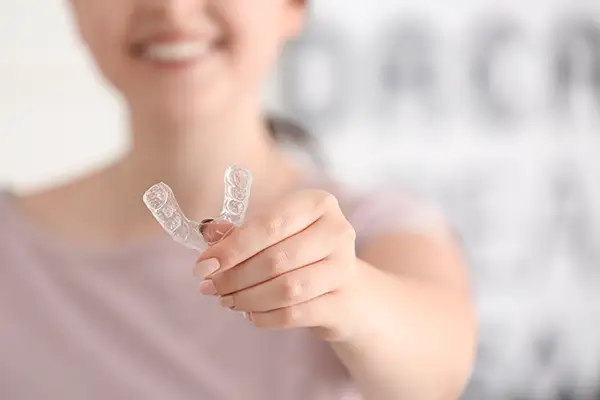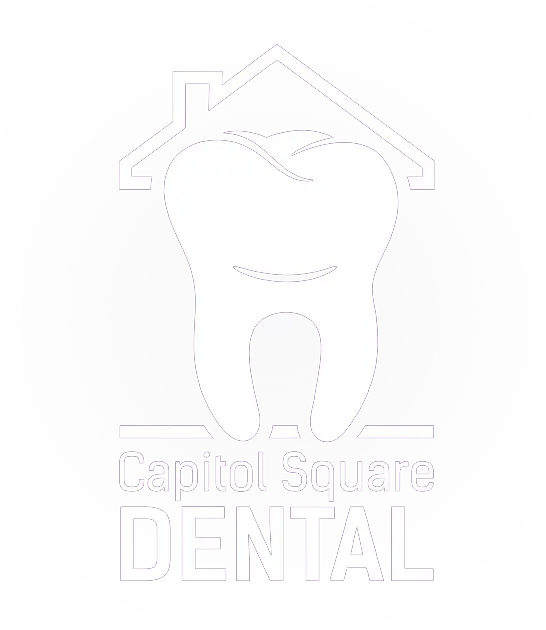Mouth Guard Did you know that your sleep habits can affect the health of both your teeth and airway? At Capitol Square Dental we can assess you and arrange for you to have a custom-made mouth guard. This can help with a variety of problems, including snoring, obstructive sleep apnea (OSA), and teeth grinding, which can cause you problems sleeping as well as dental health issues. Did you know that your sleep habits can affect the health of both your teeth and airway? At Capitol Square Dental we can assess you and arrange for you to have a custom-made mouth guard. This can help with a variety of problems, including snoring, obstructive sleep apnea (OSA), and teeth grinding, which can cause you problems sleeping as well as dental health issues.If you continually feel tired or have an aching jaw or teeth when you wake up, you may have nocturnal habits or disorders that contribute to your symptoms. Wearing a nightguard when you go to bed could be a simple answer to your problems, which can be helpful for a variety of conditions. SnoringSnoring is a very common issue that can lead to many sleeping problems. Individuals may not be aware they are snoring, but others in the same room will know, especially partners who often feel deprived of sleep because their loved one's snoring disrupts their own sleep cycles. Similarly, when someone has fallen asleep with an open mouth, sometimes nasal congestion makes noises louder than usual which causes more disruption for those in the room. There are several different reasons why people might struggle with excessive noise from breathing while asleep. These range from allergies and alcohol intake to weight gain around the neck causing constriction of the airways. A mouth guard may not help in all circumstances, but if snoring is due to your airway being blocked at the back of the throat when the tongue muscles become too relaxed then it may be an option. When you wear a guard, it pulls the lower jaw forward so that breathing remains unobstructed while sleeping. BruxismBruxism can be caused by stress or anxiety, but it may be related to oral health problems, such as crooked teeth, an abnormal bite, or sleep disorders such as sleep apnea. The condition causes jaw clenching or teeth grinding that can damage teeth, prosthodontics (such as crowns), and other appliances, like braces. However, as well as causing damage to the teeth, it can also lead to stiffness and pain in the jaw, tooth sensitivity, and sore gums. By wearing a mouth guard to separate the top and bottom teeth, friction is alleviated. Teeth grinding or jaw clenching (bruxism) is a common condition that can be caused by stress or anxiety. It may also stem from sleep disorders like sleep apnea, crooked teeth, or an abnormal bite. The severe clenching of the jaw while sleeping could cause damage to your mouth - including damaged teeth due to friction between the top and bottom sets of teeth as they grind together; TMJ (temporomandibular joint) problems causing pain in muscles on both sides near cheekbones at the temples where the lower jaw connects with the skull; tooth sensitivity, and sore gums. Obstructive Sleep ApneaThe struggle with OSA can be serious because sufferers intermittently stop breathing when they sleep. They may do so for a matter of seconds or considerably longer, and it happens many hundreds of times in some cases. Despite the fact these people do not get much of a restful night's sleep, their condition puts added strain on their body which increases the risk of acute medical problems like stroke or heart attack - all before long-term effects take place such as mental health issues from lack of adequate sleep. Although treatment is usually with CPAP (continuous positive airway pressure) machine therapy, some people cannot tolerate it. Thus, a mouth guard is a less obtrusive solution that pushes the lower jaw forward to keep the airway open. If you would like more information about mouth guards, contact Capitol Square Dental by calling us at (614) 461-4600. |
 Phone(614) 461-4600 HoursTues: 9:00am - 6:00pm Thurs: 8:00am - 3:30pm M, W, F, S - By appointment only |